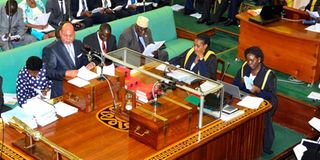How Parliament missed chance to streamline national security

Internal Affairs minister Gen Jeje Odongo addresses MPs recently. On Thursday he told lawmakers that the women murders are connected to witchcraft. PHOTO BY ALEX ESAGALA
What you need to know:
Wakiso murders. After Internal Affairs minister Gen Jeje Odongo explained to MPs that the Wakiso murders were connected to “illuminati”, MPs protested the explanation. But Prime Minister Ruhakana Rugunda assured MPs that it was witchcraft at play, Ibrahim A Manzil writes.
After a fairly long recess, Parliament suspended its sitting that was convened on Tuesday due to failure by government to provide explanation for the recent wave of killings in Wakiso District.
Parliament, on the face of it, was being genuinely concerned about national security, most especially the safety of women in the country.
Thursday, then, became the day for crucifying the security chiefs, with Kyadondo East MP Robert Ssentamu Kyagulanyi speaking to the widely speculated differences between Inspector General of Police Gen Kale Kayihura and Security minister Lt Gen Henry Tumukunde.
“There seems to be evident conflict between the minister of Security and the Inspector General of Police and the two organs are failing each other at the expense of Ugandans,” said Mr Kyagulanyi.
It is also clear that Parliament exercises oversight over any security organ in place, which is why the conversation about declining security in the country cannot end without the omission or commission of the legislator.
First, in May at the height of reports about torture of suspects at the infamous Nalufenya police detention facility, MPs easily approved Gen Kayihura’s term.
To save face, the MPs agreed to write to President Museveni to communicate some areas of discomfort with the IGP and police’s record.
Why didn’t the MPs avail themselves of that chance to ask the hard questions about security in the country, even if it needed staying the approval of Gen Kayihura, a key player?
In fact, Gen Kayihura’s entry to Parliament that day was kept a top secret, a glimpse of which journalists got when the process, held in camera, was already underway.
Second, this country and most certainly the victims of insecurity have more for which to hold Parliament to account than they probably have for the Executive.
That came by way of having the Committee on Appointments, an eternally closed door affair, with God, the MPs and the nominees only knowing the terms upon which those mandated to serve in the Security sector are approved.
Alive to the realities
Now that the country is alive to the realities of women being murdered in a serialised pattern, the security chiefs are certain that their Parliament won’t bite after all, beyond the grandstanding. This clearly explains why Internal Affairs minister Gen Jeje Odongo explained to MPs that the murders are connected to witchcraft, illuminati if you like.
“There is strong evidence linking the suspects and Katongole [a suspect the minister named]. Some suspects were found with forms given to them by Katongole to enlist in illuminati,” said Gen Odongo.
Who knows illuminati, and what is their address? No further explanation.
Although MPs protested the explanation, Prime Minister Ruhakana Rugunda made a blunter point, assuring MPs that it was witchcraft at play after all.
“In as much as For God and My Country is the motto of this country, backwardness and witchcraft still characterise some parts of our country,” said Mr Rugunda.
Never mind that police’s Director of Medical Services Moses Byaruhanga told this newspaper that during autopsy procedures, there wasn’t any evidence of removed organs that could lend credence to government’s “witchcraft” theory.
Most instructive is the fact that with all the killings happening, a report to Parliament by government came as an afterthought, contrary to what would be expected, that after a long recess in which a lot happened in security, it would be natural for government to present a statement on first instance.
This all brings us to the kind of scrutiny Parliament has over the security organs, waiting for a problem to occur, making strong statements, and when time comes for vetting the same people, they are approved with a clean bill of health.
So, who does Parliament hold accountable for the obtaining state of affairs in the security situation?
Why should any claims of misalignment and bickering within security chiefs only be accorded a passing mention by Parliament?
In attempting to address these killings and general matters of security, there should be no attempt by Parliament to pass the buck; it stops with the august House.
The public mandated that institution to play the significant role of holding government to account, through the sweeping powers accorded to it by the Constitution.
Indeed, when Deputy Speaker Jacob Oulanyah overruled any debate as to whether the Appointments Committee should be opened to the public, the matter of public accountability was safely buried.
The Security minister, IGP or any other officer mandated with running national security are now shielded by Parliament from the court of public opinion since their vetting will forever remain a closed door affair.
It is about time public functions are exercised with due consideration to public emotions, and with sensitivity about the damage that comes when a public office, especially that concerned with safety, begins to make a pattern of offering explanations that are hardly coherent in matters of public safety.
There should be no pretense about the state of affairs in the security circles.
It was the late Assistant Inspector General of Police Andrew Felix Kaweesi who used to give the country all assurances about how our security is water tight.
He has since fallen to the sword of insecurity, a recent example that should warrant seriousness in the conversation of national safety.
Buhweju County MP Francis Mwijukye has since vowed to lead a censure motion against Gen Odongo, a clearly knee-jerk, earth-bound move.
Dear Parliament, time for theatrics is over; Ugandans want a comprehensive scrutiny of the security services to engender seamless delivery of public safety.




